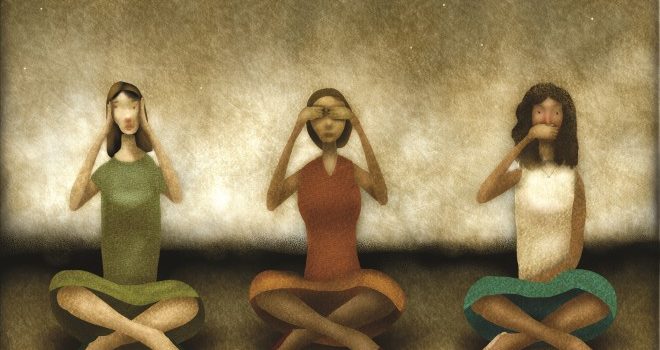
Menstruation, despite being a completely natural and common occurrence for young girls and women for as long as our species has existed, is also one of the most misunderstood and feared phenomena ‒ for about the same period of time. Call it what you want ‒ your period, the monthlies, menses, or Aunty Flo ‒ menstruation has been a taboo topic in many parts of the world and continues to be in more conservative communities. It has led to females being subject to shame, fear, strange (and even cruel) rituals and exclusion from aspects of social and cultural life, often for reasons not backed by any logical or scientific reasoning. Thankfully, many women are finally having the courage to stand up to these myths today..
Interestingly, the word ‘taboo’ is derived from the Polynesian word, tapua, which means both ‘sacred’ and ‘menstruation’. The words Regel in German, regle in French and las reglas in Spanish, which translate to ‘regulation’ or ‘rule’ in English, are also the same words used to describe ‒ not so surprisingly ‒ menstruation. The number of myths associated with the wrongly-believed supernatural and evil powers of menstrual blood are many, dating back to ancient tribes that believed a single drop of menstrual blood or simple gaze by a woman on her period, could kill a man. Other wild misconceptions that were once believed in the Western world are that menstrual blood could kill crops, rust iron, guarantee fidelity, and both cure and cause leprosy.
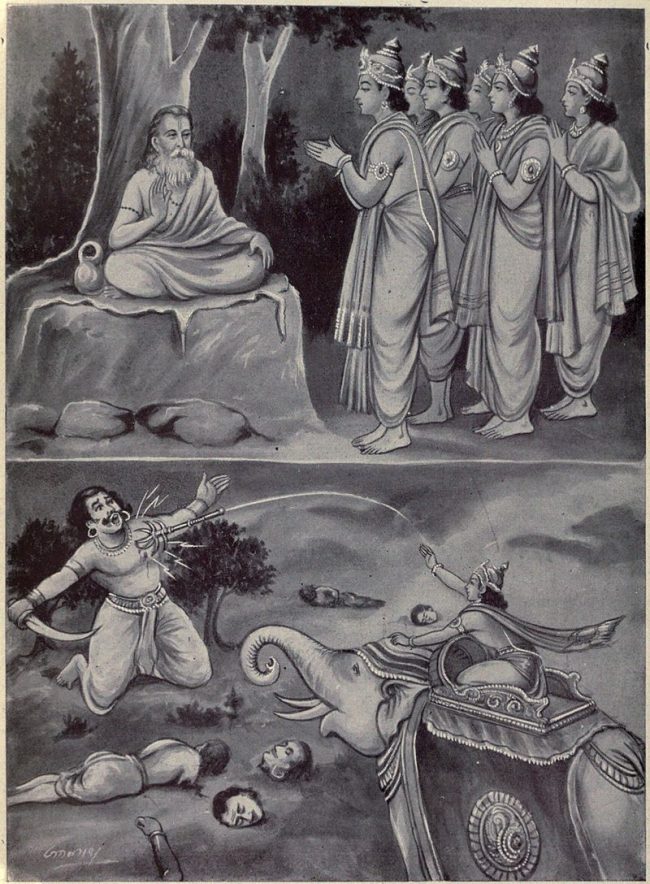
An illustration from the Mahabharatha, showing Indra killing Vritra with a thunderbolt – Courtesy wikipedia.org
In Sri Lanka, menstruation taboos vary from one ethnic or religious community to another. However, a prevalent misconception, amidst others, is what most females, since their first period at adolescence, spend a lifetime believing ‒ that menstrual blood is ‘dirty’ or ‘impure’. This idea may date back to Vedic times in India, where it was believed that women experienced monthly blood as a form of guilt on behalf of Indra (a male), who slayed Vritra. In many parts of India, to date, women who are on their period are not allowed to carry on with their everyday activities until they have stopped bleeding and are, once again, ‘pure’. This means, they are usually not allowed to enter religious places, pray, or offer poojas, touch the same utensils other family members use, or even cook.
Whilst many of these are not practiced in Sri Lanka, many Buddhist women still refrain from participating in some religious rituals whilst on their period. The idea that a woman on her period is unfit to do so, is not a claim found in any Buddhist teachings and, in this case, could be a borrowing from Hindu practices. Muslim women too are prohibited from praying, touching the Holy Quran or having sex with their husbands.
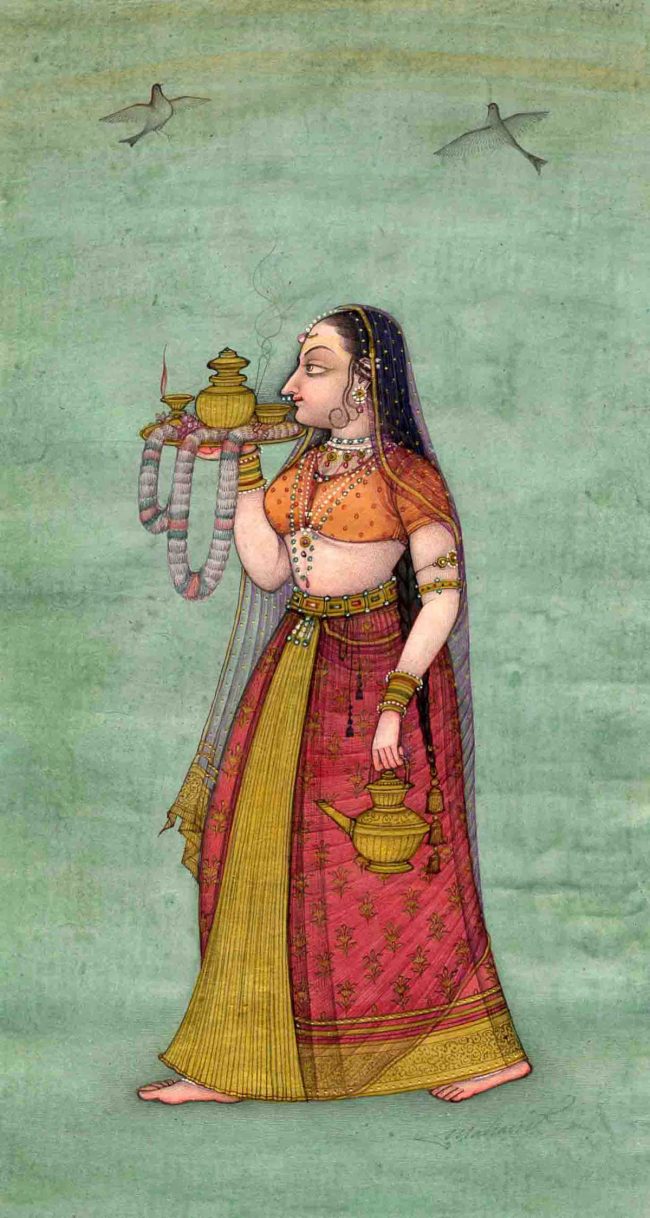
In Sri Lanka, it is custom for many Buddhist, Hindu, and Muslim women to avoid visiting the temple, praying, touching religious texts or participating in religious events while on their period – Courtesy www.bcagalleries.com
While many of the most absurd myths are, thankfully, a thing of the past, it is not uncommon for many young girls and women in Sri Lanka to be misinformed about what they can or cannot, or should or should not to do while on their period. Here are some of the most common myths we have all heard at least once, and why you should never pass them on to your daughters.
Myth #1: Period blood is ‘dirty’.
Fact: Period blood is NOT dirty; in fact, it is one of most natural occurrences known to mankind. During menstruation, women shed a lining in their uterus (womb). During this time, menstrual blood flows through the uterus through a small opening in the cervix, and passes out through the vagina. Having a menstrual cycle means a woman is healthy, because it helps to produce hormones. You can read a more detailed description of what happens during menstruation here.
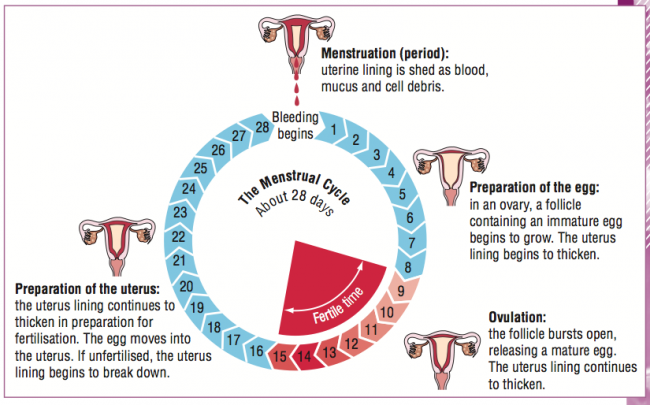
A woman’s premenstrual cycle, explained – Courtesy by portraitbydesdunes.org
Yes, period blood can smell, but for no one, specific reason and certainly not because it ís ‘impure’. The blood of any human has a smell to it, and period blood can only give off a foul odour if it has been trapped in a sanitary napkin or tampon for too long, when a woman’s acidity and PH levels are off (meaning there is bad bacteria growth in the body) or if a woman is experiencing other medical conditions, such as yeast, cervix or trichomonas infections. The solution to these would be to regularly change sanitary napkins or tampons, follow a clean and healthy diet and consult a doctor in the event of bacterial growth or infections.
Myth #2: Oily or sour food is ‘bad’ for you when menstruating.
Fact: This a very common myth in most parts of Asia. In Sri Lanka, most girls are expected to avoid oily foods when they experience their first period. There is no scientific or medical evidence for the many types of food that are supposedly ‘bad’ to eat while menstruating. In fact, the only good advice to follow is the same advice given for any day on the calendar; a clean and balanced diet, packed with lots of fruits, vegetables, and protein. Oily and sour food can certainly be consumed, as is the case for meat and seafood. However, as with any type of food, moderation is key.

Focus on foods you should eat, like spinach, which has high iron content that can help relieve muscle tension – Courtesy allrecipes.com

(Dark) chocolate really does make you happy ‒ it helps produce serotonin! – Courtesy hpvreview.com
If you are a woman, instead pay attention to what you should be eating more of during your period, for better health and not for any reasons told to you in an old wives’ tale. Because you are losing a lot of blood, try increasing your intake of iron through leafy greens, such as spinach and kale. Dark chocolate and whole grains contain magnesium, which can help reduce muscle tension, alleviate cramps and reduce mood swings. The calcium in yoghurt can also help to relax your muscles and the potassium in bananas can help to lift your mood. Foods that are rich in omega fatty acids, like salmon, avocado, and flax and chia seeds, are also great for cramps, tension, and mood swings.
Myth #3: Exercising or playing sports is ‘bad’ for you when menstruating.
Fact: The truth is, in fact, the opposite. Exercise actually has more benefits than ill effects for females who are menstruating. Regular exercise can help to ease symptoms related to premenstrual syndrome (PMS), such as cramps and bloating, because it releases endorphins and helps to produce serotonin, which promotes happiness.

Studies have shown that menstruation has no effect on the health or performance of women who participate in sports – Courtesy farm5.static.flickr.com
Many studies have also found that menstruation has no effect on the performance of exercise or sports. Again, if you are eating right to stay healthy and energised, and are wearing your sanitary napkin or tampon correctly, you should experience no great physical discomfort while working out or training while on your period. And as with any other day, commitment to your fitness goals should not let a little blood get in your way.
Myth #4: Showering or swimming during menstruation can stop bleeding or cause infertility ‒ or is just ‘bad’ for you.
Fact: If there is anything about menstruation that makes it ‘unhygienic’, it is not showering or bathing while it occurs. Again, there is no medical or scientific backing for this claim although some believe the idea that women should refrain from bathing may stem from the time people bathed in public places, such as bathhouses, lakes, or rivers. Other ridiculous claims include period blood attracting creatures like sharks to menstruating women!
But now that most of us are equipped with basic facilities for cleaning ourselves, whether at home, school, work, or the gym, it is a good idea to not skip bathing or showering in order to prevent infections.

Do not skip showering – it is entirely okay. – Courtesy downtrend.com
Women usually do not stop or slow down bleeding while on their period if they come into contact with water, whether showering or swimming. Sometimes, it may just not flow out of the vagina due to the counterpressure of the water. While today it is acceptable to go swimming while menstruating, it is important to make sure you are wearing a tampon or sanitary napkin properly, and also change them regularly.
Myth #5: Using a tampon before having sex will cause loss of ‘virginity’.
Fact: This one really depends on your own definition of a ‘virgin’. Unfortunately, in many cultures, even to date, a woman’s hymen is seen as the sole indicator of her virginity. Many conservative communities still see the preservation of the hymen as important; a mark of virtue in a woman, so much so that the absence of a hymen at the time of marriage ‒ usually the time a woman first engages in sexual intercourse in these communities ‒ leads to shame, embarrassment, and humiliation.
By the time a female reaches puberty, her hymen can be thin enough to be safely penetrated by a tampon, without causing any pain. But a woman can tear her hymen before sex, even without a tampon. This is especially the case for many women who perform sports or exercise vigorously. The hymen can also be ‘lost’ during medical examinations.
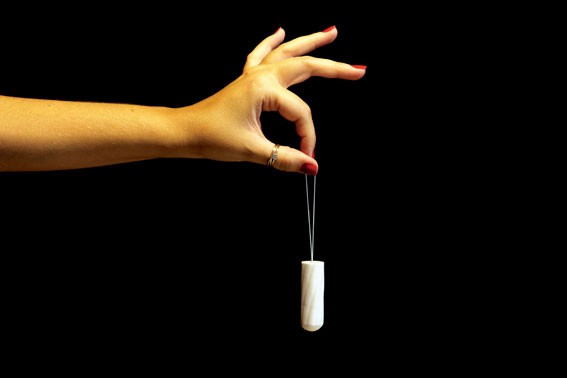
Using a tampon does not make you lose your virginity; only sex can do that. Courtesy meninos.com
The decision to use a tampon depends on your own set of values and beliefs regarding virginity. More important, in our opinion, is to choose a partner who values you no less for not having a hymen intact during your first sexual experience, whether or not you have had sex previously.
Myth #6: Sex while on your period is ‘bad’ or ‘unclean’.
Fact: Again, this really depends on personal preferences. Culturally, women have been not even been allowed to interact with men, who have believed contact with period blood is everything from disgusting to fatal. So of course, sex while menstruating was ruled out for a long, long time.
As discussed above, period sex is not unclean and there are no adverse health effects caused by having sex during this time. In fact, many women want to have more sex while menstruating, because it causes an increase in hormone activity and blood flow, which also increases arousal. So, contrary to popular belief, it is actually a great time to have sex! However, also remember that sex while menstruating does not prevent you from pregnancy or sexually-transmitted diseases.
There are just as many men who do not mind having sex while their partner is on their period, just as there are many men who are turned off by it. Have a conversation about it and try to meet each other at some point. Consent is important.
Myth #7: Women on their period are ‘crazy’ / There is no such thing as PMS.
Fact: This is probably the most infuriating myth of all, simply because likening PMS symptoms, which are very real, to mental illness is unfair and hurtful. In fact, the idea that menstruation has no effect on a woman’s mental wellbeing has been so long ignored and trivialised, that many older generations of women are still not willing to acknowledge or discuss it, for fear of being told it is all ‘imaginary’ or ‘in the head’.
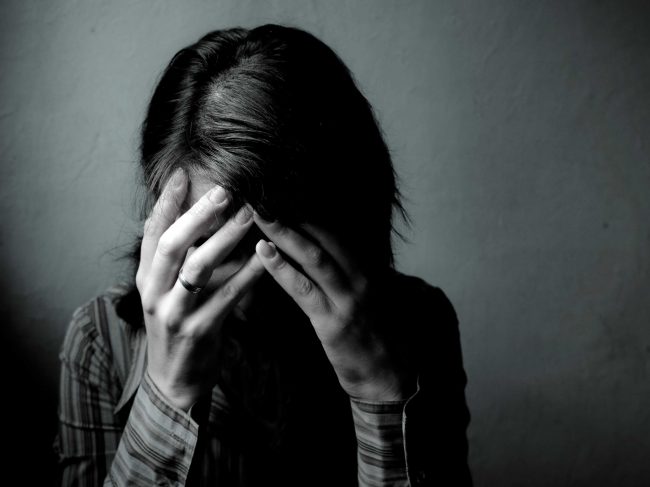
It is normal to feel a range of negative emotions before your period. PMS is real. Courtesy businessinsider.com
But PMS is normal. It is so common that nearly 50 to 85 percent of all women experience it at some point in their lives. Symptoms can begin from any time between two weeks to five days before menstruation begins, and can range from emotional to physical. It is normal to experience anxiety, mood swings, sleeplessness, fatigue, loss or increase in appetite, cramps, bloating, and so on.
If you do experience these symptoms, consider changing your diet to a healthier one, exercising, or even consulting a gynaecologist. There are many over-the-counter medicines to help relieve some of these symptoms, depending on what you are struggling with. In the meantime, don’t let anyone make you feel bad or ‘insane’ for going through PMS ‒ you are certainly not alone and help is always available.
It’s time to let menstruation myths end. For so long, they have led to misinformation, especially amongst women, regarding their own bodies, and hindered years of medical study and research on the topic. Discussing them out in the open will not only promote healthier attitudes towards menstruation amongst both men and women, but also ensure that women have an equal place in social, cultural, and religious practices.
Disclaimer: This article was not written to offend any culture or religious community, rather to highlight the absence of any scientific evidence to the validity of these myths, especially when they prevent women from living a life without equality, shame, fear, and risk to their health. Our intention is to bring forth proven facts regarding menstruation and promote awareness on better health and sanitary practices.
Featured image courtesy: badlegaindia.org








